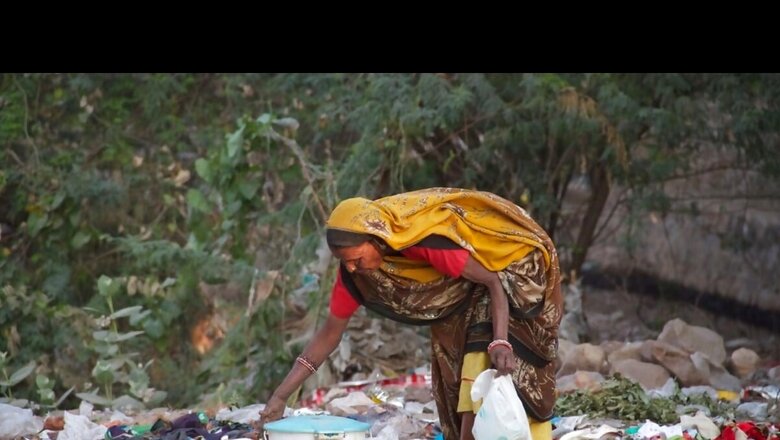
views
When it comes to drastic life changes, advice is easy to give, and really hard to follow. Perhaps one of the best ways to ‘teach’ is to ‘do’. A person who walks the talk isn’t just exemplary for their own accomplishments, but for the trail they blaze for others to follow. Fortunately for India, these trailblazers abound, often in the unlikeliest of places.
In the vast tapestry of India, where the pursuit of cleanliness and equitable sanitation services is a challenging mission, women sanitation workers are the unsung heroes who stand as beacons of hope and catalysts for change. They not only labour tirelessly to keep us and our cities safe, but also silently and surely mould the attitudes and perceptions of the younger generation.
These women, hailing from diverse backgrounds and regions across India, often encounter arduous working conditions, low pay, and societal stigmatisation. Many of them clean public toilets, collect waste from households, or operate sanitation vehicles, all while dealing with issues such as inadequate protective gear, inadequate pay and job insecurity.
Despite these adversities, this resilient group of women goes beyond the demands of work and home to create a better life for themselves and their families, and for their larger community.
Empowering Themselves
As they gain access to training, skills development, and support from organisations like Harpic World Toilet College, their self-esteem soars, and they become influential figures in their communities.
Economic Independence: Better jobs allow these women to provide better living conditions for their families. The next generation is growing up in more financially stable households, which opens up new possibilities and opportunities for them.
Maya Sable, a former sewer worker, completed her training at Harpic World Toilet College. Afterward, she secured a job with Clean and Care Facilities Service in Housekeeping, earning more than double her previous income. This newfound economic stability has transformed her family’s living conditions, providing her children with better opportunities for the future.
Shaping Attitudes: Women sanitation workers who receive training on hygiene and sanitation practices pass on their knowledge to their children. This educational exchange contributes to healthier habits and lifestyles within families.
Chhaya Warekar, a determined mother, enrolled in Harpic World Toilet College’s (HWTC) training program. Her improved knowledge of hygiene and sanitation practices influenced her children’s habits positively. They now lead healthier lives and have access to cleaner sanitation facilities, thanks to her dedication.
Advocates for Change: Empowered women become advocates for change, not only within their households but also at a broader community level. They champion sanitation improvements and promote the importance of cleanliness and hygiene.
Usha Chaumar began her career as a toilet cleaner in Alwar, Rajasthan, at just seven years old. Despite the challenges of her work being labelled “dirty,” Usha’s unwavering determination and the support of Sulabh International enabled her to become a beacon of change. Today, Usha leads the Sulabh International Social Service Organisation, advocating for better working conditions and pay for sanitation workers. Her efforts have uplifted countless women out of poverty and inspired her own family’s advancement. Her son now pursues a postgraduate degree—a testament to the choices she made.
Empowering the Next Generation
One of the most significant ways in which women sanitation workers influence the younger generation is by challenging stereotypes and altering perceptions. Children growing up in communities where these women work witness firsthand the value of hard work, dignity in labour, and the importance of cleanliness.
Women sanitation workers are role models when it comes to embracing cleanliness. Their commitment to maintaining public toilets and streets teaches children about the importance of a clean environment. The younger generation is learning that cleanliness is not just the responsibility of a select few but a collective effort.
Many women sanitation workers are actively engaged in giving their children access to education, a privilege they might not have had themselves. Their determination to break the cycle of limited opportunities is motivating the next generation to aim higher. These women understand the value of education and encourage their children to prioritise learning. As a result, we see more young minds attending schools and aspiring for brighter futures.
The children of women sanitation workers, in turn, often become ambassadors of change within their communities. As they break the shackles of intergenerational poverty, they show by example the transformative power of education and sanitation, effectively carrying forward the legacy of their mothers.
The Right Support At The Right Time
Harpic, as India’s leading brand in the lavatory care segment, has a deep and nuanced understanding of the challenges women sanitation workers face. Channelling these insights into action, Harpic founded the Harpic World Toilet College in 2016.
HWTC was established with the stated objective of improving the quality of life of sanitation workers through their rehabilitation by linking them with dignified livelihood options. Workers trained by the college are provided placement with various organisations. Following the successful proof of concept in Rishikesh, HWTCs have opened in Maharashtra, Aurangabad, in partnership with Harpic, Jagran Pehel and Maharashtra Government.
Beyond the great work it does at HWTC, Harpic is also bringing these problems to the larger masses through it’s partnership with News18 in Mission Swachhta aur Paani, a movement that champions the cause of inclusive sanitation, equality for all genders, abilities, castes and classes and the strong belief that clean toilets are a shared responsibility.
Mission Swachhta aur Paani brings together stakeholders from the govt, local municipal corporations, NGOs, grassroots organisations, self-help groups and the sanitation workers themselves. Bringing these stakeholders together on one platform enables the right conversations, and possibly, solutions that can scale to the national level.
Moreover, Mission Swachhta aur Paani is bringing these stories to you. The more we learn, the more we see our footprint in the shape of the world, the more care we exhibit in our interactions. Society is made up of people like us. What we think is what society thinks. What we think matters, what we talk about matters even more.
Isn’t it time we contributed to this national transformation? Join us here, to learn how.




















Comments
0 comment